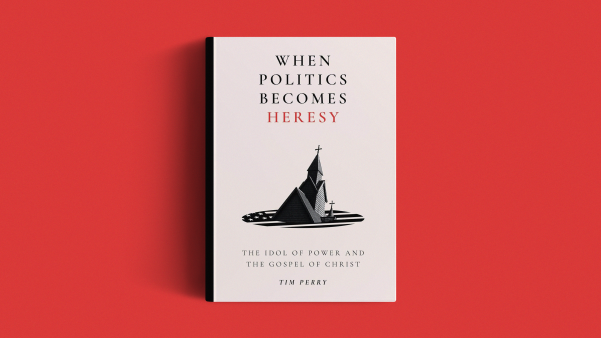The nineteenth and twentieth centuries have been times of great scientific advance. The past thirty years have brought us such marvels as jet power, nuclear power, television, and modern missiles, as well as many hundreds of gadgets that add to the comfort of mankind.
Science gives us all these things, but it does not tell us what to do with them. At this point we must have moral and spiritual resources in order to use properly the things science has created.
Give an immature boy an air rifle and he may shoot out the windows. Give the morally immature human race hydrogen bombs and missiles and they may blow the entire world to bits. Science has led us to the possibility of a Golden Age, but science has also brought us to the possibility of the destruction of the human race. Man stands at the crossroads; he must make a choice.
The word “Christian” is of Latin derivation. Literally it means “partisan of Christ” or “a member of His party.” The one thing you can say about partisans, whatever their politics is that they are never neutral. They never “play it safe,” they never “sit on the fence,” they are never spectators in the struggles of their time. They throw in their lot. They commit themselves. They hear and follow their leader, come what may. So the very word “Christian” implies a commitment of life, a decision, a choice.
Christ told us that we do not have the inner resources to face the problems, frustrations, and crises of life. We need new resources that he alone can provide. He said, “you must be born again” (John 3:7). Jesus taught clearly that unless we experience a new birth or conversion, we cannot enter the Kingdom of God.
The sense of futility in life seems common to many and is understood by almost everyone. Even the young people of today seem to share this feeling of futility. The Johns Hopkins alumni magazine asked 291 graduating seniors to submit essays appraising and defending their own generation. The apathetic result was a single reply that came from a twenty-six-year-old Navy veteran, a history major. Among other things he said, “We are resigned to a position of grayness and indecision. If my generation seems inert, it is not because we do not care; it is because we feel helpless. We are not so much lost as rootless.” The feeling of futility produces an apathy toward the moral issues of our day and unconcern over fraud and dishonesty in high places. This attitude on the part of the public is more frightening than the transgressions against decency and integrity themselves.
Man desperately needs the moral and spiritual certainties that faith in God can bring him. When modern man feels himself to be a cosmic orphan—adrift on a planet precariously balanced in space, without a personal God as his Father, without a future life to which he may aspire—then it is easy for his life to splinter when it encounters the hard problems of the twentieth century.
When Jesus Christ was on earth, he was concerned about bringing wholeness into the lives of those he met. He taught that man can be born again. He made this statement to a scholar by the name of Nicodemus. If Jesus had said, “Except you, Nicodemus, be born again, you cannot see the Kingdom of God,” we would have written it off as a statement to one particular person with no general application. But Jesus used a generic term: “Except a man he born again, he cannot see the kingdom of God.”
Immediately Nicodemus raised a question: “How can a man be born when he is old?” (John 3:4). He was not so much interested in the new birth itself as in the way it worked. He wanted to view the matter objectively. He asked, “How can a man …?,” rather than, “How can I …?” He had a tendency to argue himself out of the new birth rather than to believe himself into it.
Dr. Carl Jung, the great psychologist, once said, “All the old, primitive sins are not dead but are crouching in the dark corners of our modern hearts.” Jesus indicated that something is wrong with the human heart when he said, “Those things which proceed out of the mouth come forth from the heart; and they defile the man” (Matt. 15:18).
Psychologists realize that something is wrong with the human race. Some call it a constitutional weakness; the Bible calls it sin. The Bible describes it as the free act of an intelligent, moral, responsible being asserting himself against the will of his Maker. It has affected every part of our lives, even our minds.
Jesus says, “Nicodemus, you are scholarly, you are religious, you have position and power; but unless you are born again, you cannot see the Kingdom of God.”
All through the Scriptures runs the truth that a change is needed. Ezekiel said, “A new heart also will I give you, and a new spirit will I put within you” (36:26). In Romans, Paul speaks of it as being “alive from the dead” (6:13). In Second Corinthians he calls it being “a new creature: old things are passed away … all things are become new” (5:17). To the Ephesians he said that they had been “quickened,” or made alive from the dead (2:1). In Titus it is called “the washing of regeneration and renewing of the Holy Spirit” (3:5). Peter calls it being made “partakers of the divine nature” (2 Pet. 1:4). In the Church of England Catechism it is called “a death unto sin, and a new birth unto righteousness.”
The new birth brings about a change in disposition, in affection, in design. New aims, new principles, new dimensions of life can be yours if you put your faith and confidence in Jesus Christ.
The new birth is a mystery accomplished by the Spirit of God. When the children of Israel had been bitten by snakes in the wilderness as a judgment, thousands of them were suffering and dying. God told Moses that he should make a serpent of brass and hold it up to the people and that those who would look at the serpent would be healed. Moses held up the brass serpent. Many looked and were healed. But many refused to look. It was an insult to their intelligence; there was no healing quality in the brass. But God had said it. They did not have to rub ointment on their sores. They did not have to minister to others who had been bitten. They did not have to fight the serpent, or make an offering to the serpent. They did not have to look to Moses. They just had to look to the brass serpent in faith and beyond the serpent to God (Num. 21:8, 9).
So Jesus said, “I am going to be lifted up. Look unto me, and be saved” (cf. Isa. 45:22). Our generation could be saved by a look of faith to Jesus Christ. Science and medicine can help. Psychiatry can help. But our ultimate salvation is at the Cross of Christ, where he died for our sins and where all the possibilities of a new dimension of life exist. If we will look, we will live.
Miracle
A muddy corm
(encouraged by
a south wall and a warm
wet silver shower)
will glow
topaz, in a crocus flower!
Let April show
more wonder—
out of those soft dull clouds
lightning spears thunder;
living storm
dissolves death shrouds
of snow;
brown blankets of shaggy sod turn emerald!
Why doubt?
The sullen reprobate,
the sodden clod,
the heart of hate,
the dark of face,
the old,
watered and warmed by grace
may sprout
and grow up green and gold
for God!
LUCI SHAW
Milton D. Hunnex is professor and head of the department of philosophy at Willamette University, Salem, Oregon. He received the B.A. and M.A. degrees from the University of Redlands and the Ph.D. in the Inter-collegiate Program in Graduate Studies, Claremont, California. He is author of “Philosophies and Philosophers.”










